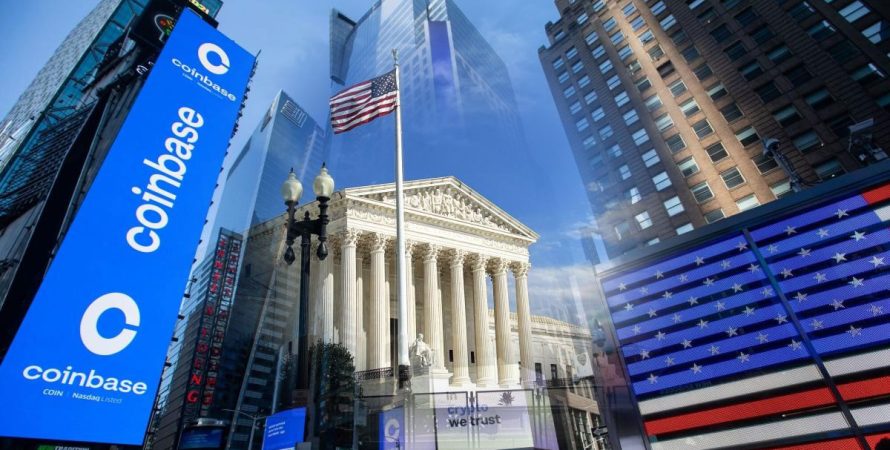The first cryptocurrency matter to come up at the high court isn’t directly about digital assets but is a dispute over how courts should handle scuffles over arbitration.
Coinbase (COIN) argued at the U.S. Supreme Court on Tuesday that its disputes over forcing customers into arbitration should freeze the courts while the arguments play out – a moment that breaks legal ground for crypto with the industry’s first high court appearance.
The case itself has little direct effect on the business of digital assets, though it could be significant for Coinbase and other crypto companies when they clash with clients. The crypto exchange essentially argued to the justices that when a court rules that a customer deserves to settle a dispute in a courtroom instead of the arbitration outlined in their user agreement, a company appeal should halt that case from progressing through the courts until the appeal is decided.
Stay in the know on crypto by frequently visiting Crypto News Today
“Congress did something very unusual” by granting this power to immediately appeal when a court denies a forced arbitration, said Neal Katyal, a lawyer representing Coinbase, who argued there’s a “background rule” establishing that the law doesn’t allow for courts to keep going if it’s used. If the customers get to move into the phase where information and evidence is exchanged, a company could be “coerced into a massive settlement” as embarrassing information comes to light – sometimes in the press – negating the purpose of arbitration.
“That toothpaste can’t later be put back into the tube,” he said.
In Tuesday’s case, Coinbase Inc. v. Bielski, customer Abraham Bielski had initially accused Coinbase of lax protections when a scammer stole $31,000 from his account. A court found that he could go ahead and pursue that complaint in the courts, which Coinbase appealed. When the matter kept moving in court, the company argued its appeal should have stopped it.
“The entire cryptocurrency market is collapsing under our feet,” said Hassan Zavareei, who represented Bielski, arguing that purposeful and automatic delays by a company could rob a person’s chance to go after the company if the business fails during the wait. A plaintiff could “wonder whether Coinbase is going to be around” while awaiting the appeal.
As for Coinbase’s argument that Congress meant for the automatic “stay” – a legal delay – he said that it’s just not there.
“Congress says what it means and means what it says,” Zavareei said.
Chief Justice John Roberts said this appeal power offered companies a “huge benefit” that they don’t have to wait until a case is over.
“This is what they gave you,” he said. “Why isn’t that enough?”
Most of the justices peppered Coinbase’s lawyer with difficult questions, and often interrupted his responses. Justice Elena Kagan was particularly critical.
In the Coinbase case, she said, “This district court is not stepping on the appeals court,” adding that “the two can go their merry ways.”
Justice Brett Kavanaugh, on the other hand, at one point praised the Coinbase case for making a “strong point” about related statutes demonstrating congressional intent for this one.![]()
Read More at COINDESK
Please Read Essential Disclaimer Information Here.
© 2024 Crypto Caster provides information. CryptoCaster.world does not provide investment advice. Do your research before taking a market position on the purchase of cryptocurrency and other asset classes. Past performance of any asset is not indicative of future results. All rights reserved.
Contribute to CryptoCaster℠ Via Metamask or favorite wallet. Send Coin/Token to Addresses Provided Below.
Thank you!
BTC – bc1qgdnd752esyl4jv6nhz3ypuzwa6wav9wuzaeg9g
ETH – 0x7D8D76E60bFF59c5295Aa1b39D651f6735D6413D
MATIC – 0x7D8D76E60bFF59c5295Aa1b39D651f6735D6413D
LITECOIN – ltc1qxsgp5fykl0007hnwgl93zr9vngwd2jxwlddvqt





